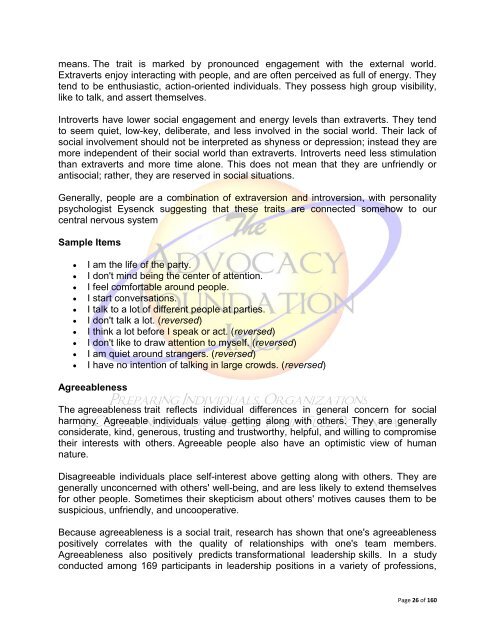The Gift of Introversion
The Gift of Introversion
The Gift of Introversion
Create successful ePaper yourself
Turn your PDF publications into a flip-book with our unique Google optimized e-Paper software.
means. <strong>The</strong> trait is marked by pronounced engagement with the external world.<br />
Extraverts enjoy interacting with people, and are <strong>of</strong>ten perceived as full <strong>of</strong> energy. <strong>The</strong>y<br />
tend to be enthusiastic, action-oriented individuals. <strong>The</strong>y possess high group visibility,<br />
like to talk, and assert themselves.<br />
Introverts have lower social engagement and energy levels than extraverts. <strong>The</strong>y tend<br />
to seem quiet, low-key, deliberate, and less involved in the social world. <strong>The</strong>ir lack <strong>of</strong><br />
social involvement should not be interpreted as shyness or depression; instead they are<br />
more independent <strong>of</strong> their social world than extraverts. Introverts need less stimulation<br />
than extraverts and more time alone. This does not mean that they are unfriendly or<br />
antisocial; rather, they are reserved in social situations.<br />
Generally, people are a combination <strong>of</strong> extraversion and introversion, with personality<br />
psychologist Eysenck suggesting that these traits are connected somehow to our<br />
central nervous system<br />
Sample Items<br />
<br />
<br />
<br />
<br />
<br />
<br />
<br />
<br />
<br />
<br />
I am the life <strong>of</strong> the party.<br />
I don't mind being the center <strong>of</strong> attention.<br />
I feel comfortable around people.<br />
I start conversations.<br />
I talk to a lot <strong>of</strong> different people at parties.<br />
I don't talk a lot. (reversed)<br />
I think a lot before I speak or act. (reversed)<br />
I don't like to draw attention to myself. (reversed)<br />
I am quiet around strangers. (reversed)<br />
I have no intention <strong>of</strong> talking in large crowds. (reversed)<br />
Agreeableness<br />
<strong>The</strong> agreeableness trait reflects individual differences in general concern for social<br />
harmony. Agreeable individuals value getting along with others. <strong>The</strong>y are generally<br />
considerate, kind, generous, trusting and trustworthy, helpful, and willing to compromise<br />
their interests with others. Agreeable people also have an optimistic view <strong>of</strong> human<br />
nature.<br />
Disagreeable individuals place self-interest above getting along with others. <strong>The</strong>y are<br />
generally unconcerned with others' well-being, and are less likely to extend themselves<br />
for other people. Sometimes their skepticism about others' motives causes them to be<br />
suspicious, unfriendly, and uncooperative.<br />
Because agreeableness is a social trait, research has shown that one's agreeableness<br />
positively correlates with the quality <strong>of</strong> relationships with one's team members.<br />
Agreeableness also positively predicts transformational leadership skills. In a study<br />
conducted among 169 participants in leadership positions in a variety <strong>of</strong> pr<strong>of</strong>essions,<br />
Page 26 <strong>of</strong> 160

















